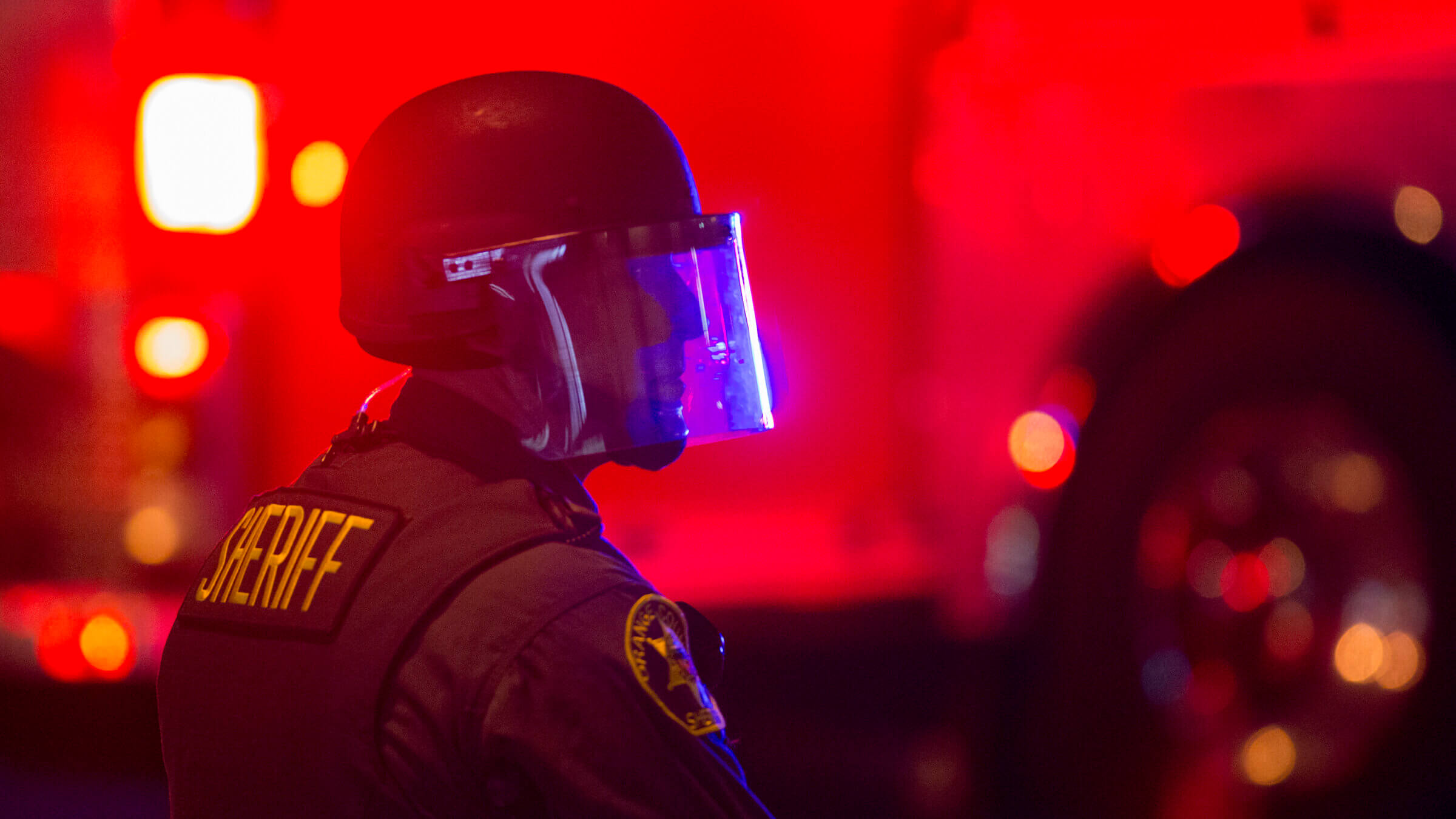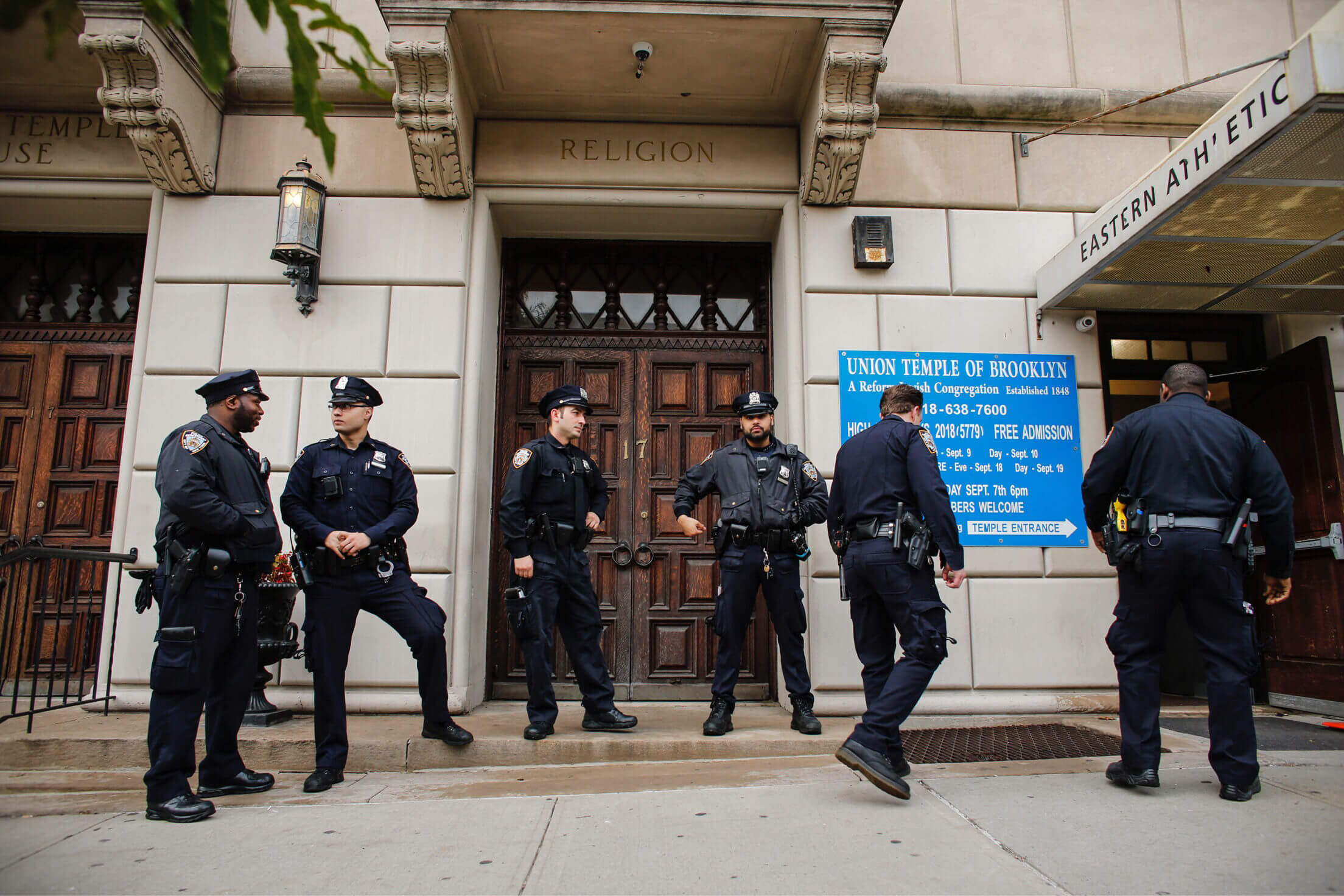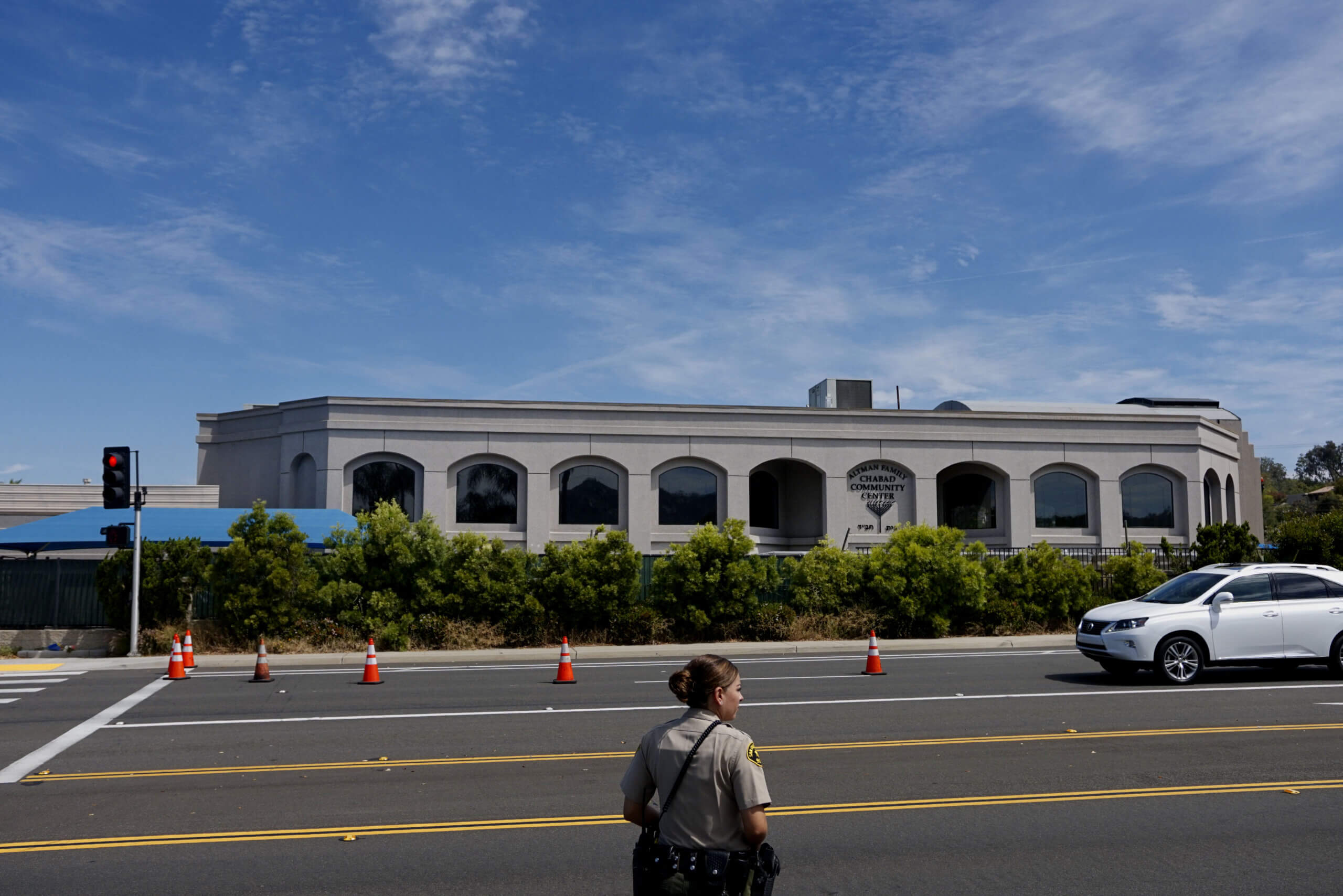Bomb threats and ‘swatting’ campaign hits dozens of synagogues
At least 26 institutions have experienced incidents since late July as online trolls work together to harass Jews and other religious minorities

More than 20 synagogues and other Jewish institutions have been ‘swatted’ and hit with bomb threats in recent weeks, part of a coordinated antisemitic campaign organized by online trolls. Orange County sheriffs deputies, like the one pictured above in 2016, responded to a bomb threat at a Fullerton, Calif., synagogue Saturday. Photo by Getty Images
The disruption came toward the end of Shabbat services Friday at Temple Beth Torah in Fremont, California. Five police officers walked into the back of the sanctuary and told the 25 or so worshippers that someone had reported that somewhere in the synagogue was a backpack containing a bomb.
Cheryl Cohen, the congregation’s president, wasn’t surprised. Two weeks earlier, she had received a notice from the Anti-Defamation League alerting synagogue leaders to a wave of similar incidents at synagogues across the country. As of Monday, the ADL has identified at least 26 bomb threats or incidents of “swatting,” in which someone calls the police with a false report of an active shooter or similar crime in progress, targeting synagogues and other houses of worship across 12 states.
Police took about 20 minutes to clear Beth Torah after congregants evacuated. The congregants passed the time outside singing Jewish songs like “Bim Bam.”
“It wasn’t a panic — it was very calm,” Cohen said. “It was surreal that it happened to us, but because we had gotten the community advisory it wasn’t a total shock.”
The following day, someone called the police in Fullerton, California, to say that a bomb would detonate in 20 minutes at Temple Beth Tikvah, a local congregation. Rabbi Mati Kirschenbaum could be seen on Facebook Live interrupting services and announcing “we need to stop and leave the building right now.”
The Orange County Bomb Squad found no explosives, and police said the false report did not constitute a crime.
“Sadly, the sense of potential threat is something that many Jewish houses of worship have to live with,” Kirschenbaum told reporters.
‘Swatting’ a new threat for synagogues
Oren Segal, who runs the ADL’s Center on Extremism, said the organization believes that a small group of individuals coordinating with each other on social media is responsible for the incidents. They appear to be targeting synagogues that livestream videos of services online.
“These trolls are weaponizing online tools to harass the Jewish community,” Segal said. “They want to watch these services get disrupted by law enforcement.”
Brad Orsini, a senior adviser for the Secure Community Network, a Jewish security organization that is also monitoring the threats, said that most have been bomb threats: calls, like the ones involved in the Fremont and Fullerton incidents, that suggest someone has planted a bomb in the building, and require them to be evacuated.

But there have also been a significant number of swatting incidents, a form of criminal harassment in which a person calls police with a false report intended to compel a dangerous police response. In a notorious 2017 case in Wichita, Kansas, police killed a 28-year-old man at his home after receiving a call falsely claiming that someone inside the residence had murdered his father and was holding other family members hostage.
A recent example of swatting occurred this past weekend when Orsini said someone tried to disrupt a bar mitzvah service at a Texas synagogue by telling police that shots had been fired inside.
“Law enforcement got one of those calls, rolled up to the synagogue, and fortunately there was a guard outside monitoring traffic,” Orsini said. The guard told police it was a false report and they left. “The inside was never disrupted.”
The ADL identified dozens of bomb threats targeting Jewish institutions last year. But Segal said the volume and coordination of the recent series of both bomb threats and swatting is unprecedented.
He added that callers have also targeted Black churches and Sikh temples.
Secure Community Network sent an alert to its membership network Saturday describing some of the recent bomb threats and swatting. The group also announced that they had been in touch with the FBI and Department of Homeland Security.
Trolls organize synagogue threats online
Analysts from both the ADL and SCN have been following social media conversations between some of the people who appear to be involved in making the threats. Segal said that the group’s apparent organizers have made “vile antisemitic comments,” and appear to believe classic antisemitism conspiracy theories about Jewish control of the media and government.
He declined to share other details about the apparent perpetrators, including which social media platforms they are using, citing active law enforcement investigations.
On 4chan, the anonymous online forum popular with white supremacists and other extremists, users joked on Saturday about making synagogue bomb threats and swatting.
“Trying to find a mosque across from a synagogue so we can call something in and get a hearty kek from the headlines tomorrow,” one person wrote. (“Kek” or “kekking” is slang used by the far-right to refer to laughing.)
Another user on 4chan’s politics forum suggested a way to ensure a heavy police response to the institutions being targeted.
“Maybe if everyone spam reports the same type of crime at the same location or something for half an hour with the same details,” another user suggested. “No sissy reports like burglary. Like full on terrorist mass shooting at a mosque or synagogue kind of reports.”
A wave of false reports in March of imminent bombings or mass shootings at schools across the country seemed to increase the popularity of the tactic, Orsini said. The latest wave, aimed at Jewish institutions and other houses of worship, began on July 20.

While neither the ADL nor Secure Community Network are releasing a full list of incidents, at least two houses of worship in San Diego have been affected: Congregation Beth Israel, a Reform congregation, and Kehilat Ariel Messianic Synagogue, which is affiliated with the Messianic Jewish sect of Christianity.
On July 29, a caller told a suicide hotline that someone inside Congregation B’nai Israel, a Conservative synagogue in Millburn, New Jersey, was “threatening self-harm,” a congregant told TAPinto Millburn/Short Hills, a local news site. “It was a swatting incident, so there was no person with a gun in the building,” the person said. “Congregants were safe and continued with services.”
Two threats have been aimed at ADL offices. Segal said those responsible posted a list of demands related to the threats on social media, including calls for YouTube and Twitter to remove the ADL’s accounts.
“They view ADL as an extension of the larger Jewish community,” Segal said. “They don’t like us.”
Uncertainty on next steps for synagogues
For now, there are no clear rules for how synagogues should protect themselves from bomb threats or swatting calls. Both Segal and Orsini said they were not encouraging congregations to stop livestreaming services.
Cohen, the synagogue president in Fremont, said that her congregation made the decision to leave cameras rolling while police searched the sanctuary because they were worried that cutting the feed might unduly alarm online viewers.
Steve Arnold, security director for the Chabad of Poway, California, where a congregant was killed in a 2019 mass shooting, received the community alert about the swatting incidents. He briefed his team of volunteers on what to do if law enforcement responded to such a call at the synagogue: just follow their commands.
Unlike police who respond when the synagogue itself calls for help, the officers who respond to a swatting report will be operating off information intended to mislead them and cause maximum havoc for congregants, he said.
“You do everything they say. You don’t say ‘well, wait a second,’ and you point. You go: ‘I’m on the ground.’ Because law enforcement — they are coming in not knowing what the trigger is,” Arnold said. “It’s a whole new training now for us.”
Correction: A previous version of this article misstated the name of Temple Beth Torah.
























